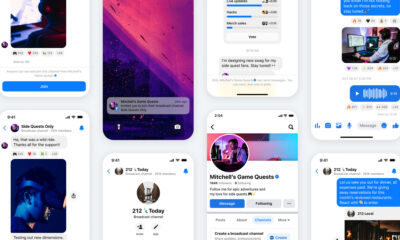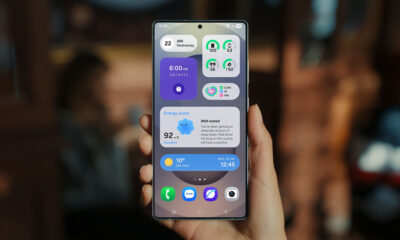News
Facebook Is Working On A Smartwatch With Messaging & Health-Tracking Capabilities
As part of its ongoing quest to dominate our lives, Facebook is working on a smartwatch with messaging and health-tracking capabilities, informed The Information on Friday.
The smartwatch will reportedly run on the Android operating system, but it’s unclear whether if Facebook decides to use the established Wear OS platform or release the smartwatch with its own flavor of Android.
In any case, Facebook’s smartwatch will focus heavily on messaging and health-tracking, presumably featuring lightweight versions of the social network’s family of services, including not only Facebook but also Instagram and WhatsApp.
Because the smartwatch will have a built-in eSIM card, it won’t have to be tethered to a smartphone to access the internet, a feature that’s guaranteed to appeal to all fitness users, especially if it delivers integrations with products from companies like Peloton.
The release of the Facebook smartwatch won’t be the company’s first push into other market segments. For example, Facebook’s Oculus VR headsets are among the most popular products of their kind, boasting a thriving ecosystem that’s home to some of the most innovative virtual reality experiences currently available.
As such, the biggest obstacle standing in Facebook’s way to success likely won’t be its ability to create an attractive product but its poor reputation among consumers and regulators, neither of which might not be thrilled by the idea of the company having access to users’ health data 24×7.
Also Read: Apple Likely To Release 8K VR Headset In 2022
Of course, Portal, a standalone video chat device released by Facebook that sparked similar privacy concerns, is still selling well, so it seems that many consumers are still willing to sacrifice their privacy if it means getting their hands on an attractive product.
While the first generation of the Facebook smartwatch will probably play it safe, future generations could benefit from Facebook’s acquisition of the neural interface startup CTRL-Labs in 2019, which specializes in building wireless input mechanisms.
News
Rabbit Expands Hyperlocal Delivery Service In Saudi Arabia
The e-commerce startup is aiming to tap into the Kingdom’s underdeveloped e-grocery sector with a tech-first, locally rooted strategy.

Rabbit, an Egyptian-born hyperlocal e-commerce startup, is expanding into the Saudi Arabian market, setting its sights on delivering 20 million items across major cities by 2026.
The company, founded in 2021, is already operational in the Kingdom, with its regional headquarters now open in Riyadh and an established network of strategically located fulfillment centers — commonly known as “dark stores” — across the capital.
The timing is strategic: Saudi Arabia’s online grocery transactions currently sit at 1.3%, notably behind the UAE (5.3%) and the United States (4.8%). With the Kingdom’s food and grocery market estimated at $60 billion, even a modest increase in online adoption could create a multi-billion-dollar opportunity.
Rabbit also sees a clear alignment between its business goals and Saudi Arabia’s Vision 2030, which aims to boost retail sector innovation, support small and medium-sized enterprises, attract foreign investment, and develop a robust digital economy.
The company’s e-commerce model is based on speed and efficiency. Delivery of anything from groceries and snacks to cosmetics and household staples is promised in 20 minutes or less, facilitated by a tightly optimized logistics system — a crucial component in a sector where profit margins and delivery expectations are razor-thin.
Despite the challenges, Rabbit has already found its stride in Egypt. In just over three years, the app has been used by 1.4 million customers to deliver more than 40 million items. Revenue has surged, growing more than eightfold in the past two years alone.
Also Read: Top E-Commerce Websites In The Middle East In 2025
CEO and Co-Founder Ahmad Yousry commented: “We are delighted to announce Rabbit’s expansion into the Kingdom. We pride ourselves on being a hyperlocal company, bringing our bleeding-edge tech and experience to transform the grocery shopping experience for Saudi households, and delivering the best products – especially local favorites, in just 20 minutes”.
The company’s growth strategy avoids the pitfalls of over-reliance on aggressive discounting. Instead, Rabbit leans on operational efficiency, customer retention, and smart scaling. The approach is paying off, having already attracted major investment from the likes of Lorax Capital Partners, Global Ventures, Raed Ventures, and Beltone Venture Capital, alongside earlier investors such as Global Founders Capital, Goodwater Capital, and Hub71.


























